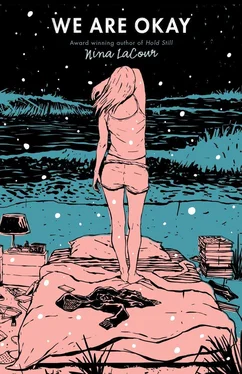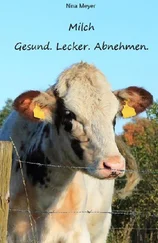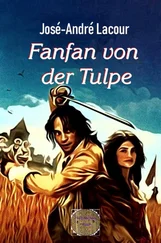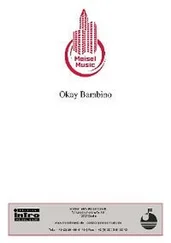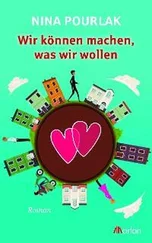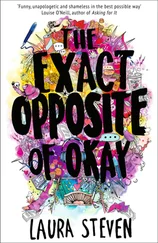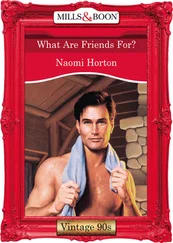“Of course you would know it by heart.”
“Well, it’s amazing.”
“I thought the whole thing would be that way, but it’s just confusing and pointless. The ghosts—if there are ghosts—don’t even do anything. They just show up and stand around.”
I opened our iron gate and we climbed the stairs to the landing. Gramps was calling hello before we’d even closed the door behind us. We set down our coffees, shrugged off our backpacks, and went straight to the kitchen. His hands were covered in flour; Wednesdays were his favorite because there were two of us to bake for.
“Smells delicious,” Mabel said.
“Say it in Spanish,” Gramps said.
“ Huele delicioso . What is it?” Mabel said.
“Chocolate Bundt cake. Now say, ‘The chocolate Bundt cake smells delicious.’”
“Gramps,” I said. “You’re exoticizing her again.”
He lifted his hands, busted. “I can’t help it if I want to hear some words in a beautiful language.”
She laughed and said the sentence, and many other sentences with only a few words I understood, and Gramps wiped his hands on his apron and then touched them to his heart.
“Beautiful!” he said. “ Hermosa! ”
And then he headed out of the kitchen and saw something that made him stop. “Girls. Please sit.”
“Uh-oh. The love seat,” Mabel whispered.
We crossed to the faded red love seat and sat together, waiting to discover the subject of that afternoon’s lecture.
“Girls,” he said again. “We have to talk about this .” He picked up one of the to-go cups that we’d set on the coffee table, held it with disdain. “When I was growing up, none of this stuff was here. Trouble Coffee . Who names an establishment ‘Trouble’? A bar, sure, maybe. But a café? No. Mabel’s parents and I spend good money to send you girls to a nice school. Now you want to stand in lines to buy lunch and spend far too much on a cup of coffee. How much did this cost?”
“Four dollars,” I said.
“ Four? Each? ” He shook his head. “Let me offer you a helpful piece of advice. That is three dollars more than a cup of coffee should be.”
“It’s a cappuccino.”
He sniffed the cup. “They can call it whatever they want to call it. I have a perfectly good pot in the kitchen and some beans that are fresh enough for anyone.”
I rolled my eyes, but Mabel was ardent in her respect for elders.
“It was a splurge,” she said. “But you’re right.”
“ Four dollars.”
“Come on, Gramps. I smell the cake. Shouldn’t you check on it?”
“You’re a sly girl,” he said to me.
“No,” I said. “Only hungry.”
And I was. It was torture to wait for the cake to cool, but when it did, we devoured it.
“Save a sliver for the fellas!” Gramps implored us, but for four old guys, his friends were the pickiest eaters I’d ever known. Like the girls at school, they were off gluten one week only to suddenly be on it again if the meal was enticing enough. They were laying off sugar or carbs or caffeine or meat or dairy, but maybe a little butter was fine now and then. When they broke their own rules, they complained about it. Took bites of Gramps’s sweets and declared them too sugary.
“They don’t deserve this cake,” I said between bites. “They won’t appreciate it like we do. Maybe you should mail a piece to Birdie. Overnight it.”
“Does she know about your baking?” Mabel asked him.
“I may have mentioned it once or twice.”
“One bite of this and she’ll be yours forever,” Mabel said.
Gramps shook his head and laughed, and Mabel and I were soon stuffed and happy, traipsing back out as Jones, the first of Gramps’s buddies, arrived, holding his lucky card deck in one hand and his cane in the other.
I took a minute to talk to him.
“Agnes is having surgery on her hand again Tuesday,” he told me.
“Do you guys need any help with anything?”
“Samantha’s taking some days off from the salon,” he said.
“Maybe I’ll come by and say hi.”
Samantha was Jones and Agnes’s daughter, and she’d been so nice to me in the months I lived with them when I was eight and Gramps had to spend some time in the hospital. She drove me to school and back every day, and even after Gramps came home she helped us, picking up his new prescriptions and making sure we had food in the house.
“She’d love to see you.”
“All right,” I said. “We’re headed to the beach. Try to hold on to your money.”
Mabel and I walked the four blocks to the beach. We slipped off our sandals where the road met the sand and carried them up a dune, weaving through patches of beach grass and the green-and-rust-colored ice plants. We sat at a safe distance from the water while the flocks of gray-and-white sanderlings pecked at the shore. At first it looked like no one was out there, but I knew to watch and to wait, and soon, I saw them: a pair of surfers in the distance, now mounting their boards to catch a wave. We watched them against the horizon line, rising and falling. An hour passed, and we lost sight of them over and over, and each time found them again.
“I’m cold,” Mabel said when the fog set in.
I scooted closer to her until the sides of our bodies touched. She gave me her hands, and I rubbed them until we were warm. She wanted to go home, but the surfers were still in the water. We stayed until they reached the sand, tucked their boards under their arms, turquoise and gold against their wet suits. I waited to see if one of them would know me.
They got closer, a man and a woman, both squinting to see if I was who they thought I’d be.
“Hey, Marin,” the man said.
I lifted my hand.
“Marin, I have something for you.” The woman unzipped her backpack and pulled out a shell. “Claire’s favorite kind,” she said, pressing it into my palm.
Then they were past us, making their way to the parking lot.
“You haven’t asked me what I’m writing about,” Mabel said.
The shell was wide and pink, covered in ridges. Dozens like it filled three large mason jars in my bedroom, all of them gifts. She held out her hand and I dropped it in.
“Jane Eyre. Flora and Miles. Basically everyone in A Mercy .” She ran her thumb over the shell’s ridges and then gave it back. She looked at me. “Orphans,” she said.
Gramps never spoke about my mother, but he didn’t have to. All I had to do was stop by the surf shop or show up at the beach at dawn, and I’d be handed free Mollusk shirts and thermoses full of tea. When I was a kid, my mom’s old friends liked to wrap their arms around me, pet my hair. They squinted in my direction as I approached and beckoned me toward them on the sand. I didn’t know all of their names, but every one of them knew mine.
I guess when you spend a life riding waves—knowing that the ocean is heartless and millions of times stronger than you are, but still trusting that you’re skilled enough or brave enough or charmed enough to survive it—you become indebted to the people who don’t make it. Someone always dies. It’s just a matter of who, and when. You remember her with songs, with shrines of shells and flowers and beach glass, with an arm around her daughter and, later, daughters of your own named after her.
Читать дальше
